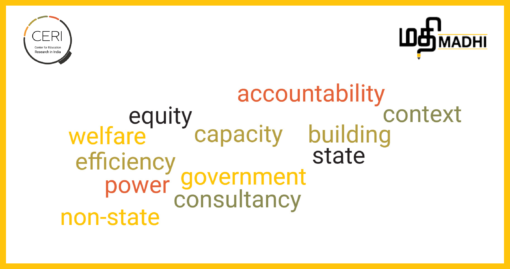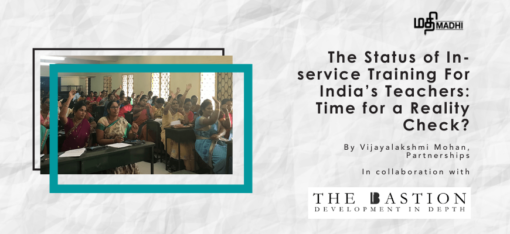




Government partnership – done right
What are some risks that the government seemingly overlooks while collaborating with a non-state partner? As non-state actors, what can we do to quell apprehensions and make the engagement purposeful and beneficial to society?
A typical conversation that I have in any social gathering goes like this:
Someone: “What do you do for a living?”
Me: “I work with the school education department”.
Someone: “So, you’re a government employee?”,
Me: “No, I work for a non-profit that strengthens public education systems. We support the government in areas like curricular reforms, teacher training, conceiving technology solutions…”
Someone: “But if you do what the government does, what are the government employees doing?”
And that’s how the role of non-state actors is most commonly confused, contorted and misunderstood. As the recently published report1 by UNESCO says, ‘apart from building and running schools, non-state actors also provide supplementary services such as textbook publishing, content creation, teacher training, Mid-Day Meal (MDM) preparation, support for Information and Communications Technology (ICT), managerial inputs, and overall policy support, among other things’.
Along similar lines, an article2 by Ms Yamini Aiyar critically examines the increasing involvement of consultants working with the Union and State departments. While she states that “Crucially, consultation, engagement, innovation and dialogue in policymaking are an essential democratic act and, in a limited way, the “consultant” is part of this democratic process”, she also carefully looks at the “risks it poses to the goal of building State capacity and bringing evidence and innovation in policy.”
Both the report and the article raise some legitimate concerns about the ownership shown by the government in building a welfare state. Is the state being let off the hook by collaborating with consultants? Are we downplaying the importance of state capacity building by opting for quick fixes over deeper, more sustainable transformation? Is the larger goal of equity traded off for a unilateral focus on efficiency? This article aims to shed some light on practical strategies that can be opted to allay these concerns.
Equity versus Efficiency
Efficiency is producing quality work with optimal resource utilisation. It is a long-held belief in economic theory that efficiency comes at the cost of foregoing principles of socio-economic equity. The report states, ’While non-state participation, especially the engagement of the private sector, brings with it some resources, the culture of functioning that is focussed on efficiency and the achievement of outcomes, comes with a price. The price is equity.’
Some economists have also held that efficiency is a means to an end, not the end unto itself. While focusing on socio-economic upliftment, efficiency cannot be an outcome or the end goal. Equity should be an outcome that a state strives to achieve. From policy formulation to project implementation and evaluation, a robust end-to-end project lifecycle should be enforced to promote efficiency in the government to realise the goal of equity. Non-state actors can contribute effectively towards improving the efficiency of service delivery. For instance, in a project currently run at Madhi Foundation, focusing on providing opportunities for higher secondary school students to enter institutes of academic eminence, we look both at process and engagement outcomes (Timely issuance of Govt. Order/Department. Circulars, Attendance of training etc.,) and impact outcomes (Number of students across various categories who successfully enrol into premier institutes) – keeping efficiency as a means to attain the larger social goal of equity while tracking success indicators for both.
Augmentation of capacity
The role of a consultant need not be seen as a ‘replacement’ to the department personnel. In a Conclave organised by Madhi Foundation, Ms Pooja Kulkarni IAS., the current MD & CEO of Industrial Guidance and Export Promotion Bureau (GUIDANCE), Tamil Nadu, stated, “Complementarity will come if the private partner’s project implementation can improve the government’s resource. The expectation is that nonprofits have the capacity to improve the capacity of government resources, not replace them.”
As an organisation, Madhi Foundation strongly believes in augmenting the state’s capacity rather than supplementing it. Working with the state resource personnel to achieve a common goal through co-creation and co-design is hard but not impossible. Sharp roles and responsibilities with a clear vision of what the programme intends to achieve can make capacity augmentation a reality. For instance, when Madhi was a part of the curriculum revision process in 2017-19, we supported the resource group of the state to conduct reviews, track progress, and conceive ideas. The subject matter experts of the state shared ideas deeply rooted in the context of the teaching-learning realities of the system. We provided targeted tracking mechanisms and shared best practices from across the world. This experience was an eye-opening exercise for the organisation – it showed us how to leverage the state’s institutional knowledge while working on projects at scale. Being open to learning and adaptive also helped us build trust and credibility with various stakeholders.
Power dynamics
Where there are people, there is politics, and it is true in any social set-up, whether family or work. Age, experience, and qualification contribute to the hierarchical dynamics in a state’s machinery. The power struggle between department personnel and consultants is a known risk. As mentioned above, the department personnel have a wealth of institutional knowledge critical to envisioning any policy reform. Leveraging the strengths of each team member in the project, be it the state personnel or the consultants, will help achieve a common goal. Most importantly, rooting all conversations in empathy – be it the personal secretary of an officer or the officer will build trust that can also reap dividends in the long run.
Accountability
Ms Aiyar, in her article, also puts forth a two-pronged argument – one being ‘doing the job of the State lets the State off the hook’ and the second being that the private player and the government are each accountable to different parties.
The state’s job is to formulate policies promoting public welfare. The consultant’s job is to support the state in maximising its capacity towards achieving that outcome. In a functional democracy, a state can never be left ‘off the hook’ because the government is answerable to its people.
In cases where the government has hired a private player to provide services, they are expected to produce detailed work reports. They have personnel salaries linked to meeting certain success criteria defined by the department. Additionally, private or non-profit organisations also have a reputational stake in any government engagement that encourages them to work with diligence.
Sunset clause
What are non-state actors doing in their capacity to ensure the sustainability of their intervention? In a country like ours, where policy reforms are long-drawn and complex, adopting a sunset clause is yet to see the light of day. As a country, we have not reached a point where sunset clauses are effectively promulgated. Much little can be achieved by organisations which are minuscule in scale compared to governments to bring life to this clause.
As a collective, over the course of their engagement, non-state actors should commit to ensuring that strengthening the state’s capacity is a priority area, if not immediately, atleast over the horizon.
Understanding the context
We’ve had an officer who jokingly remarked that consultants come with a cure for headaches when the ailment is stomach ache! Elaborate diagnostic tests and needs analyses will allow contextual interventions to evolve. The non-state actors should align their projects to the needs of the state and work towards targeting quality benchmarks set by the State and the Union.
Government is a gargantuan machinery, and any private entity is a mole-hill in comparison. There is no doubt that the government can successfully roll out welfare schemes without private players – the RTE’s success in ensuring access to schools across most states, implementation of the mid-day meal scheme, and eradication of polio are stellar examples of the same. However, with social problems becoming complex and multifaceted in a world reeling in the aftermath of a global pandemic, the need of the hour is to ensure urgent redressal through sustained efforts by both parties. The onus on the state is to legitimise the role of consultants after carefully evaluating their service to work together for the larger good. Innovation, creativity, and efficiency should go hand in hand. It is the collective responsibility of society to hold the state accountable towards ensuring that the last mile citizen is centric to its development.
References
REGULATION OF NON-STATE ACTORS IN SCHOOL EDUCATION IN INDIA, 2022
Government by ‘Consultant’ can hollow out the State, December 2022
https://bmcpublichealth.biomedcentral.com/articles/10.1186/1471-2458-12-S1-S3
This article was written under the aegis of the Centre for Education Research in India (CERI). CERI, an initiative powered by Madhi Foundation, is a digital repository and think-tank catering to policymakers, practitioners, and academics in the education sector and the larger community, to catalyse reform in the education ecosystem in India.
em {font-style: italic; font-size: 16px;}
table tr td {
width: 100%;
}

The Status of In-service Training For India’s Teachers: Time for a Reality Check?
Vijayalakshmi Mohan writes for The Bastion just how far we have come in supporting in-service teachers in primary schools in their continuous professional development.

Dealing with the juggernaut – 5 attitudes that will help you build a great relationship with the government system
“I do not think very highly of NGOs and am always suspicious of their intentions. They all come with their own agenda – to show the government in poor light and to tell us they know better” something an official told us in our first meeting with them way back in early 2017, when Madhi was taking baby steps in engaging with the government. “We trust that you will recommend only the most relevant approach” – this was the same official talking to us about the way forward, just a few weeks ago.
So what changed from 2017 to 2020?
A key ingredient in all successful partnerships – both in the personal and professional realm – is trust. The relationship between an NGO and its government partner is no different. In fact, it may take many years and relentless efforts towards establishing transparency, accountability and empathy, to build professional trust.
Over the past few years of deep engagement with multiple stakeholders, our team has identified 5 critical attitudes that contributed to building a truly synergistic partnership with the government. The learning curve has been steep and the journey rather daunting, but we are truly grateful for all the lessons learnt along the way.
1. Be relentlessly optimistic
We have an inside joke – we joke about the fact that we will not wonder if the glass is half full or half empty but celebrate the fact that ‘we at least have a glass’!
It is extremely challenging to sustain a long-term engagement with the government without firmly believing that change is possible. Will is a necessary catalyst for completing any marathon, and allowing cynicism to get the better of us undermines our motivation and upsets the balance of the partnership. Being hopelessly optimistic even in the most testing times, and spreading that infectious enthusiasm within your team is your best bet to surviving the ebbs and flows of working with the government machinery.
2. Be patient but persistent
There have been multiple instances where we have had to wait for hours together for a brief 15-minute discussion with a government representative. And even as we found creative ways to make the waiting time purposeful, we were conscious to constantly recall that each meeting, despite the frustrating delays, was an important and vital step towards achieving the goal we were all working towards. In fact, your tenacity and commitment may be secretly scrutinised and there is no better way to demonstrate your zeal than by being painfully patient and tactfully persistent.
3. Be empathetic but get heard
Despite all the clichés around government offices and officers, you may be surprised to notice your perceptions changing once you start working with your government partners closely. Many of the government officials work extremely hard, often in a politically charged, socially volatile, and grossly understaffed environment. You may not hear this very often, but government officers deserve our empathy too. However, be careful not to drop the ball. While being empathetic is acknowledging the constraints faced by the other party, your empathy must not distract your focus away from the outcomes from the partnership. It is all too common to be thrown some curveballs by the government officials – some genuine, and some just to get rid of the pesky NGO that you are. Being unable to issue permissions, sign an MoU on time, or release funds as planned, are some of the many roadblocks you are likely to encounter along the way. In such cases, we have always strived to let empathy and not frustration guide our responses. Working together to resolve the situation, to offer multiple solutions, and being open to tweaking your programme as long as it does not adversely affect the outcomes, can allow you to offer an empathetic yet purposeful response when an officer is unable to honour their original commitment.
4. Detach
‘Thiruvinai venRu vAzh’ translated to ‘do not expect (favourable) results for your actions’ is a profound quote by the Tamil poet Bharati. While dealing with the government, uncertainty is the only constant. You want to survive the long haul? Detach. Detachment is two-fold in our case. Firstly, there is a need to detach oneself from ‘your’ hold over ‘your’ idea. The ‘mine’ or ‘me’ in your proposition needs to disappear. Let the focus be on the outcome and not so much on where the idea came from or whose it was to begin with. Secondly, understand that many variables and interdependencies affect the outcome and in the end, the fruits of your labour may fall short of your hopes. If the Covid-19 pandemic has taught us anything, it is that despite our best plans, things can go awfully wrong. Working with the government has shown us not only how to pour our heart and soul into crafting a perfect programme, but also to cultivate an almost zen like detachment from the consequences of the chaos outside our control. It has helped us to grow immensely, both professionally and for many of us, personally.
5. Be humble and let the learning never stop
Carl Sagan’s ‘Pale Blue Dot’ concept is a magnificent illustration of our next point. The government is a gargantuan machinery. A juggernaut that continues to function despite the myriad constraints and limitations. As if on some kind of ‘auto-pilot’, come rain or shine, the show goes on. Nobody and nothing is indispensable to it and this humbling realisation reflects in our every single interaction with the government. Know that you know little. There is a wealth of knowledge that can be collectively generated through meaningful collaborations with the government and that begins with our acknowledging that we are but a dot in an expansive sky. Be open to treating every interaction with an official as a learning opportunity. No public policy course from any Ivy League institution may teach you what a 15 minute middle-of-the-corridor conversation with a mid-level officer might. You can only understand the nuances of the government’s working ‘style’ by listening intently even during the most mundane interactions.
All said and done, we do not claim to know all the answers. There still are many days when we secretly wish we had a perfectly functioning system or a slightly less difficult officer to deal with. But we quickly realise that without these challenges we may not have evolved into the kind of resilient, optimistic and determined team that we are today. If you truly believe that the problem you have resolved to tackle is worth solving, let that guide you and let your will to see it through permeate every conversation – so much, that it is difficult for government officers to ignore your energy or wish you away!

Foundational learning crisis in India: Evaluating a way forward
Reading, a basic skill, is aptly called the gateway skill to lifelong learning. Research indicates that if a child is unable to reach a certain degree of grade-level competency in literacy and numeracy by the end of class 3, the learning gap will only further deepen, perpetuating inequity and economic loss (Muralidharan and Zieleniak, 2013).
Children in India can expect to complete 10.2 years of pre-primary, primary and secondary school by age 18. However, when years of schooling are adjusted for quality of learning, this is only equivalent to 5.8 years: a learning gap of 4.4 years. This means that a student in class 8 has an average learning level of a class 4 student (World Bank, 2018).
“The rest of the Policy will be largely irrelevant for such a large portion of our students if this most basic learning (reading, writing, and arithmetic at the foundational level) is not first achieved. Attaining foundational literacy and numeracy for all children must become an immediate national mission and an indispensable, non-negotiable part of the curriculum.” (Draft National Education Policy, 2019)
Renowned researcher Karthik Muralidharan succinctly talks about the criticality of foundational learning. A key challenge for the skilling sector in India today is that the students who enter skilling or job-training programs have very poor literacy and numeracy — and are thus often not equipped even to handle the curriculum of the skilling programs. This is because, by the time students are earmarked for vocational tracks in school and directed to such programs, they have already fallen far behind the curriculum and have weak foundational skills (Muralidharan, 2019).
Factors responsible for the foundational learning crisis and the way forward:
1. Adoption of non-contextual curriculum and pedagogic strategies across states.
Most states in the country are tasked with myriad problems ranging from teacher absenteeism to teacher surplus, but do not make concerted efforts towards making context-specific policy solutions. The need of each state is varied, its problems are localised and complex to solve. It is essential to identify these problems and tailor-make solutions that would apply to every state’s context.
2. Lack of accurate standardised skill-based assessment at primary level
The purpose of assessments is to send signals to parents, teachers, and policymakers. These are signals to secondary teachers, employers, and even parents, that children are equipped with certain skills. In recent times, much noise has been generated over the quality of learning in schools through large scale assessments like ASER and NAS. It is important to improve awareness around these assessments at the parental level in order to focus the needle on the demand-side of education.
3. Non-targeted training programmes for teachers (especially in-service) offering minimum scope for adoption into practical classroom strategies
Currently, training programmes offer very little scope for practicum-based learning for teachers. While pre-service teacher training in itself needs to be overhauled, much needs to be done in revamping in-service teacher-training. The training needs to become targeted for teachers, with a clear targeted learning pathway established for every teacher in each state across the country.
4. Absence of monitoring mechanisms to promote transparency in data-based governance
Currently, there is no nation-wide system that promotes transparency through data-backed governance. However, if every official who visits the classroom captures data and makes it available to make decisions, policies can be based on sound evidence. Clear-cut, goal-driven foundational learning mission will certainly yield desirable results. If this activity is coupled with incentives to promote accurate data collection, the system is bound to become a fool-proof means of capturing real-time classroom data.
5. Excessive focus on input-oriented parameters
Most states in the country have spent huge sums of money on publishing like new textbooks, new supplementary reading materials, new digital learning aids, etc., with little or no focus on aligning the focus of provisioning the same towards improving quality of foundational learning. It is important to attune every agency within the education department in each state to work towards aligning all their efforts to strengthening attainment of foundational learning outcomes in the states.
A collective failure of the Indian education system is that even after seven decades of independence almost three-fourth of 8-year-old children who leave class 3, cannot read or comprehend. This is a moral injustice and deserves urgent redressal. The lack of such skills potentially leads to such children losing out on employment on entering the job-market contributing to economic growth. The huge amount of money which currently goes into building schools and teacher and support staff salaries’ would be futile if there is little effort towards making children attain foundational literacy and numeracy. This must change.
References
1. Muralidharan, Karthik and Zieleniak, Yendrick (2013), ‘Measuring Learning Trajectories in Developing Countries with Longitudinal Data and Item Response Theory’
2. World Bank,
3. Muralidharan, Karthik (2019), ‘Reforming the Indian School Education System’ in What the Economy Needs Now, edited by Abhijit Banerjee, Gita Gopinath, Raghuram Rajan, and Mihir Sharma, Juggernaut
